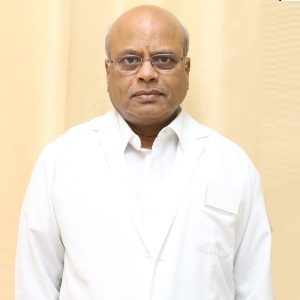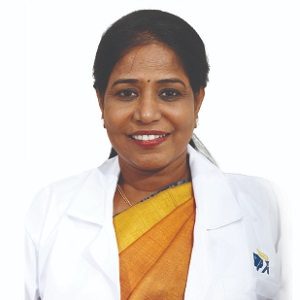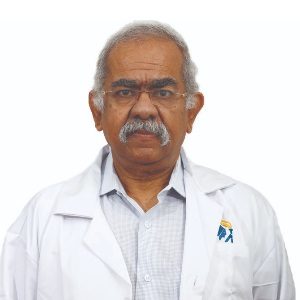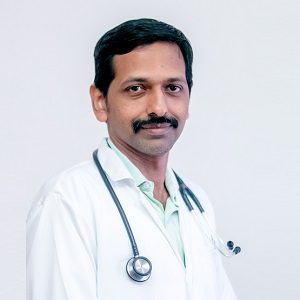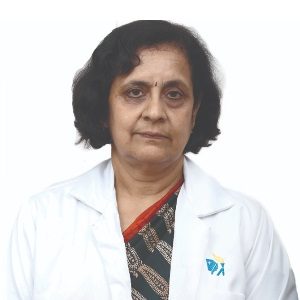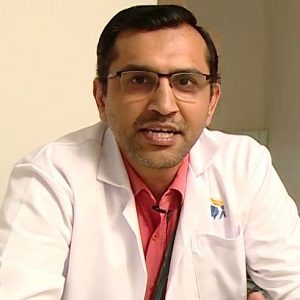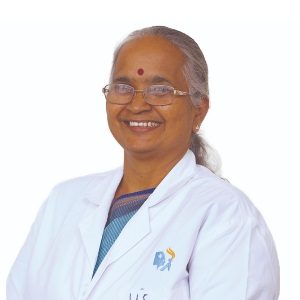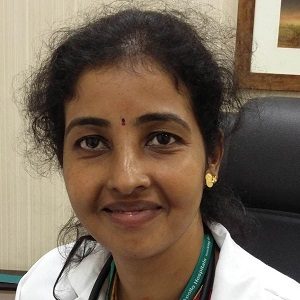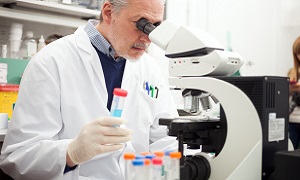Best Doctors in India for Lynch Syndrome Treatment
- Surgical Gastroenterologist, Chennai, India
- Over 27 years’ experience
Profile Highlights:
- Dr. Surendran R is an experienced gastroenterologist from Chennai, Tamil Nadu.
- He has been rewarded for his contributions to the field several times. He received The Best Doctor award from the Tamil Nadu government (2002) in his name.
- Being a gastroenterologist, he specializes in treating patients with problems such as Bowel Obstruction, Pancreatic diseases, Esophagus disorders, Fistula treatment, etc.
- Gastroenterologist and GI Medicine Specialist, Chennai, India
- Over 23 years’ experience
Profile Highlights:
- Dr. Revathy Shanmugam is an experienced Gastroenterologist in Tamil Nadu, having an experience of 23 years in the management of GI disorders, Training & Teaching.
- She is highly skilled in the services like Liver Disease Treatment and Inflammatory Bowel Disease (IBD) Treatment.
- She has published various scholarly works in many National & International Publications of Medical Gastroenterology.
- Gastroenterologist and GI Medicine Specialist, Chennai, India
- Over 32 years’ experience
Profile Highlights:
- Dr. Hariharan Muthuswamy is a veteran Gastroenterologist and Hepatologist in India with 22 years of experience (specialist).
- Dr. Muthuswamy treated his patients with Non-Surgical Piles treatment, Liver Disease Treatment, Hepatitis E, Hepatitis A Treatment and Hepatitis B Treatment, Hemorrhoids Treatment, Colonoscopy, Stomach, and Intestinal Treatments, etc.
- He has a special interest in Capsule Endoscopy, Therapeutic Endoscopy, GERD, and Irritable Bowel Syndrome (IBS).
- Gastroenterologist and GI Medicine Specialist, Chennai, India
- Over 32 years’ experience
Profile Highlights:
- Dr. Mohan A T is a veteran GI medicine specialist in India with an experience of 32 years.
- Dr. Mohan, an alumnus of Madras University, is the Co-Ordinator of the Indian Society of Enteral and Parenteral Nutrition.
- He is an expert in treating Gastritis, acidity, Ulcerative Colitis, and many other Intestinal and bowel-related Treatments. In addition to these, he offers Colonoscopy, Gastroscopy, and Endoscopy.
- Gastroenterologist and GI Medicine Specialist, Chennai, India
- Over 15 years’ experience
Profile Highlights:
- Dr. Piramanayagam P is one of the young Gastroenterologists in India, having an experience of 15 years in the field.
- The doctor offer services like Gall Bladder (Biliary) Stone treatment, IBS treatment, Acidity Treatment, Endoscopy, and stomach and intestine dysfunction.
- He published many review articles and books under his name.
- Gastroenterologist and GI Medicine Specialist, Chennai, India
- Over 39 years’ experience
Profile Highlights:
- Dr. Sarojini Parameswaran is one of the renowned Gastroenterologist with an overall experience of 39 years.
- Dr. Parameswaran is brilliant and quick with diagnosis. She has 22 years of specialist experience.
- Gastroenterologist and GI Medicine Specialist, Chennai, India
- Over 24 years’ experience
Profile Highlights:
- Dr. Seshadri Venkatesh P is a well-known Gastroenterologist in India, having 24 years of experience in Stomach and Intestine disorders.
- Dr. Seshadri acquired proficiency in managing Bladder Cancer surgery, hemorrhoids, Irritable Bowel Syndrome (IBS) Treatment, etc.
- He holds membership in Tamil Nadu Medical Council.
- Gastroenterologist and GI Medicine Specialist, Chennai, India
- Over 40 years’ experience
Profile Highlights:
- Dr. Usha Srinivas is a Gastroenterologist in India with an experience of 40+ years in GI in medicine and academics.
- Patients visit her for consultation and treatment of abdominal pain, Gall Bladder (Biliary) Stone, Gastroenteritis, Jaundice, Colonoscopy, Steatosis, Constipation Treatment, Hepatitis C Treatment, Hepatitis E Treatment, Hemorrhoids Treatment, Piles Treatment (Non-Surgical), Gastritis Treatment, Ulcerative Colitis Treatment, and others.
- Gastroenterologist and GI Medicine Specialist, Chennai, India
- Over 18 years’ experience
Profile Highlights:
- Dr. Preethi M is one of the best gastroenterologists in India, with 18 years of expertise.
- Dr. Preethi received many awards for her contribution to the field.
- She offers consultation for Irritable Bowel Syndrome (IBS), Hemorrhoids, Endoscopy, female problems, and other gastrointestinal issues.
- Gastroenterologist and GI Medicine Specialist, Chennai, India
- Over 23 years’ experience
Profile Highlights:
- Dr. Ubal Dhus is a GI specialist doctor in South India who is proficiently managing Gastroenterological disorders for the past 23 years.
- He acquired his medical degree from Madras University, Chennai, and served people with Hemorrhoids Treatment, and Irritable Bowel Syndrome (IBS) Treatment.
Best Hospitals in India for Lynch Syndrome Treatment
Venkateshwar Hospital, Dwarka, New Delhi
- City: New Delhi, India
Hospital Highlights:
- State-of-the-art technology and devoted healthcare professionals have been brought together under one roof at Venkateshwar Hospital to provide genuine medical care. The hospital’s professionals work together as a team to deliver the best possible treatment to their patients, using the most sophisticated equipment and information technology.
- Venkateshwar Hospital’s mission is to attain global excellence in healthcare by employing evidence-based, ethical clinical practices and cutting-edge technology by a team of highly skilled experts.
MGM Healthcare, Chennai
- City: Chennai, India
Hospital Highlights:
- Located in Chennai, India, MGM Healthcare is a top multispecialty hospital that provides all medical services under one roof.
- Since its founding in 2019, MGM Healthcare has quickly become a leading national referral centre, creating several innovative flagship initiatives.
- MGM Healthcare combines next-generation medical and digital technologies to provide better patient results.
- With 12 centres of excellence, more than 400 inpatient beds, 100 intensive care unit beds, and 24/7 emergency care, MGM Healthcare leaves no chance in redefining the patient experience in Chennai.
- MGM Healthcare boasts 250+ expert doctors across 30+ departments, including Cardiology, Pulmonology, Neurology, Obstetrics & Gynaecology, and more.
- They house 12 specialized Centres of Excellence, including Neurosciences, Orthopaedics, and Multi-Organ Transplantation.
- Their team of doctors, nurses, and paramedics works together to give every patient individualized treatment.
Lynch Syndrome
Lynch Syndrome is an inherited condition that can increase a person’s risk of developing certain cancers such as colorectal cancer, before the age of fifty. It may also be referred to as nonpolyposis colorectal cancer.
People having Lynch syndrome can have a lifetime risk of having colorectal cancer, endometrial cancer, ovarian cancer as well as stomach cancer. Lynch syndrome can also make cancer more likely in parts such as the skin, brain, kidney, liver, gallbladder, small intestine as well as urinary tract.
Lynch syndrome is known to be the most common inherited cancer syndrome and affects as many as 1 in every 370 people in Western nations.
Symptoms
People having Lynch syndrome may develop noncancerous growths in the colon. These benign growths are also known as polyps. However, it is to be noted a number of colon polyps that develop are not affected by Lynch syndrome.
Some other symptoms and complications that lynch syndrome can lead to, include the following:
- Stomach pain
- Bleeding inside the gut
- Constipation
- Fatigue
- Unintentional weight loss
- Glioblastoma, an aggressive type of brain tumor
- Reduced ability to absorb nutrients from foods
Causes
Lynch syndrome is known to run in families in an autosomal dominant inheritance pattern. Therefore, it means that if one parent carries a gene mutation for Lynch syndrome, a fifty percent chance is there that mutation will be passed on to each child. The risk of this syndrome is the same whether the father or the mother is a gene mutation carrier or whether the child is a son or daughter.
The genes which are affected in Lynch syndrome are responsible for correcting the changes in the genetic code.
Your genes contain DNA, which is responsible for carrying instructions for every chemical process in your body. As your cells continue to grow and divide, they make copies of their DNA and in some cases, there might be few minor mistakes.
Although normal cells have certain mechanisms that help them to identify mistakes as well as to repair them, the cells of people inheriting one of the abnormal genes which are associated with Lynch syndrome, lack this ability to repair these kinds of mistakes. Genetic damage is caused when there is an accumulation of these mistakes, and eventually, this can cause the cells to become cancerous.
Diagnosis
A doctor can determine whether you have a genetic mutation that is associated with Lynch syndrome by analyzing your DNA. Before genetic testing, a doctor might review your personal and family medical history to determine how likely you are to have Lynch syndrome.
People who are having Lynch syndrome can choose to learn more about the condition by seeing a genetic counselor.
Treatment
Treatment for this condition can vary, depending on whether a person is showing signs of colorectal cancer or not.
People who are having cancer, but have not developed cancer might want to schedule regular colonoscopies and cancer screenings.
During a colonoscopy, a doctor is going to examine the colon and rectum for signs of abnormal cell growth. It is also often possible to remove colon polyps during this procedure.
Some people can choose to undergo a prophylactic colectomy, which involves removing the colon before colon cancer develops.
For people having Lynch syndrome and also having colorectal cancer, the following treatments are generally available:
Polypectomy
Colectomy
Ablation
Cryosurgery
Embolization
Complications
Other than causing complications for your health, a genetic disorder like Lynch syndrome can also raise several concerns. Some other aspects of your life which might be affected include the following:
Your privacy – The results of your genetic test will be listed in your medical record, which insurance companies and employers will be able to assess.
Your children – If you have Lynch syndrome, your child or children have a risk of inheriting your genetic mutations as well. If one parent carries a genetic mutation for Lynch syndrome, there ‘is a fifty percent chance of each child inheriting that mutation. A genetic counselor may help you to develop a plan in order to discuss this with your children. This includes how and when to tell them and when they should consider going for testing.
Your extended family – A Lynch syndrome diagnosis can have implications on your entire family since there is a chance that Lynch syndrome is present in many other blood relatives as well. A genetic counselor can help you to find the best way to tell your family members that you’re going to have genetic testing and what that the results mean.
Prevention
There is no way to prevent colorectal cancer completely, but people are able to lower their risk by getting colorectal cancer screenings.
Obesity has been linked to several different cancers, which include the following:
- Colorectal
- Esophageal
- Liver
- Kidney
- Ovarian
- Breast
- Gallbladder
- Stomach

